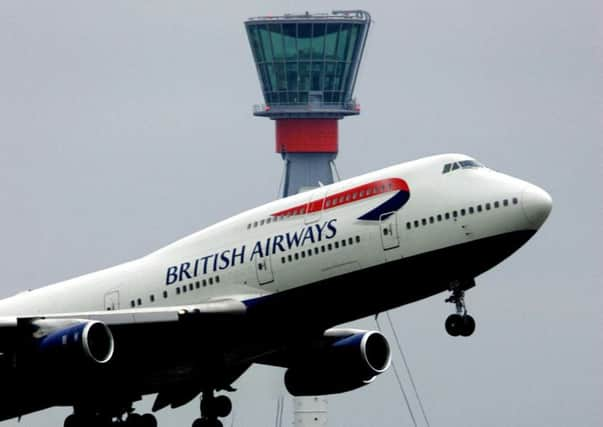Leaders: Tragedy brings home plight of migrants


Being first out of the trench when the order came to go over the top during the First World War promised a swift end. As the World Trade Centre Towers burned, 200 people threw themselves out at heights of 1,000 feet. None survived.
Migrants who stow away on planes cling to the slim chance that they will survive an ordeal that, normally, should guarantee their death. From 1947 to 2012, there were 96 attempts, globally, to gain illegal entry to another country by hiding in the undercarriage of an aircraft. Only 23 survived, and they were usually on short-haul routes.
Advertisement
Hide AdAdvertisement
Hide AdOn a long-haul flight, the effects of altitude means lungs cannot function, and the temperature can drop below -60C.
Yesterday’s tragic events, in which a man appeared to have clung on within a long-haul jet from Johannesburg to London before falling to his death at Richmond, minutes from landing, is likely to be further evidence that the situation faced by people in other parts of the world is so grave that they feel they have nothing to lose by risking their life to escape.
We do not know what forced the stowaway to take such a chance, although another man who was also believed to have hidden on the same flight was last night still alive in hospital, albeit in a critical condition.
But we do know why thousands of migrants from places such as Syria, Sudan and Somalia have made perilous journeys to Europe this year via the Mediterranean, on vessels unfit to make the crossing and barely able to stay afloat. They are fleeing war, persecution, poverty, and slavery.
At Calais, an estimated 3,000 migrants seek passage to the United Kingdom by any means possible. Around 2,000 of them arrived in April, and are understood to have come via the Mediterranean.
Economic migrants have been the lifeblood of the planet, spreading expertise, knowledge and innovation. But those currently fleeing their country are an extreme version, and they represent the increasing gap between the rich and the poor, the healthy and the sick. The gulf between these two worlds is now so vast that thousands of people will gamble with their lives to reach a better place – many knowing that if they do not, they will die in any case.
Is Britain doing enough to help this global crisis? No. And Prime Minister David Cameron’s decision to admit “a few hundred more” Syrian refugees is a token gesture. But if Britain threw open its borders, this gesture alone would not solve the humanitarian crisis the world faces. A far deeper problem exists, which cannot be ignored or denied any longer.
SNP is yet to prove it can do the double
On the face of it, the huge savings that local authorities say they will have to make over the next few years can only look like bad news. Edinburgh City Council confirmed yesterday that cuts amounting to £107 million must be made over the next five years, affecting 1,000 jobs, and Glasgow estimates cuts of £100m over two years, hitting 3,000 jobs. It is the same story across the country, to varying degrees.
Advertisement
Hide AdAdvertisement
Hide AdThe loss of jobs will be a further blow to unemployment figures, which are currently running at higher than the UK average. Thousands of jobs disappearing in the public sector will make it much harder to reverse that trend.
But before we can make judgment on the proposed cuts, more information is required about what this means for the provision of services. Union officials say that the cuts will have a “fundamental impact” on the provision of services, although council officials suggest that changes to working practices can protect frontline services. The key word here may be frontline, meaning we will experience a prioritisation of existing services which will see some fall away, but until each local authority shows its full hand, fears can neither be confirmed nor allayed.
Whatever the outcome, it appears that hardship cannot be avoided in many Scottish households, either in the shape of lost services or lost jobs.
The Scottish Government is committed to both protecting services and local government budgets. These are admirable aims in theory, but the government has yet to come up with a convincing indication that it can achieve both objectives.